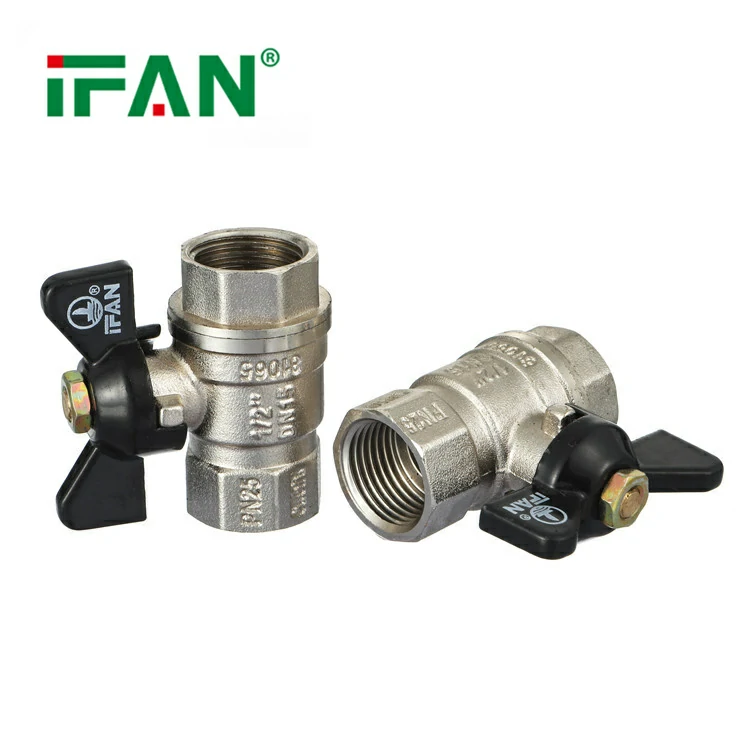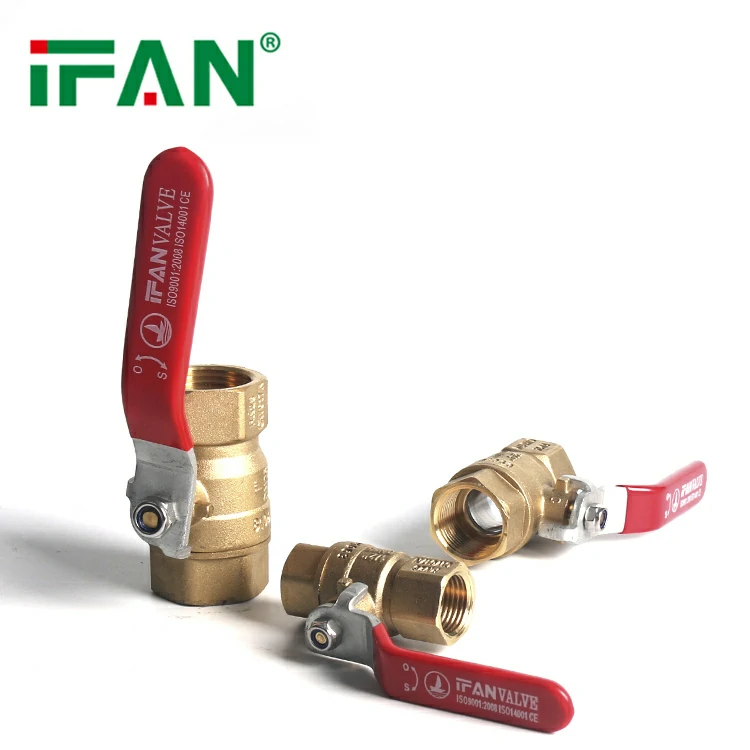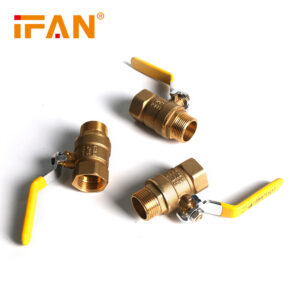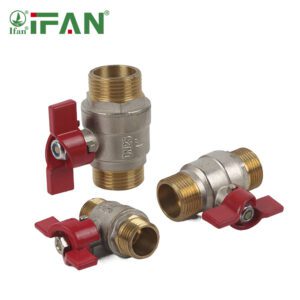Description
IFAN factory 30+ years manufacture experience support color /size customization support free sample.Welcome to consult for catalog and free samples.This is our Facebook Website:www.facebook.com,Click to watch IFAN’s product video.Compared with Tomex products, our IFAN products from quality to price are your best choice, welcome to buy!
Brass ball valves are essential components in a wide variety of plumbing, irrigation, and industrial systems. Known for their durability, ease of operation, and versatility, brass ball valves are often used to control water, gas, and other fluids. However, when it comes to using brass ball valves in harsh environments, corrosion resistance is a key factor that must be considered to ensure longevity and safe operation. In this article, we will explore the corrosion resistance of brass ball valves, how they perform in different environments, and what factors can influence their durability.
What Are Brass Ball Valves?
A brass ball valve is a type of valve that uses a spherical ball with a hole or port through the center to control fluid flow. When the valve is open, the hole in the ball aligns with the pipe, allowing fluid to pass through. When the valve is closed, the ball rotates to block the flow. Brass, an alloy composed mainly of copper and zinc, is commonly used for making these valves due to its excellent mechanical properties and corrosion resistance.
Brass ball valves are widely used in residential plumbing, industrial applications, and irrigation systems. However, like all metallic components, they are susceptible to corrosion if exposed to harsh environmental conditions or specific fluids. Understanding the corrosion resistance of brass is essential for selecting the right valve for your system.
How Brass Resists Corrosion
Brass is inherently resistant to corrosion, particularly in neutral and mildly alkaline environments. The material forms a protective oxide layer on its surface when exposed to air, which helps prevent further degradation. However, the degree of corrosion resistance can vary depending on several factors, including the specific alloy composition, the fluid passing through the valve, and the environmental conditions in which the valve operates.
Alloy Composition and Corrosion Resistance
Not all brass ball valves are made from the same alloy. Brass can be manufactured in different grades, such as **Leaded Brass** (which contains lead) and Lead-Free Brass, each of which has different corrosion-resistant properties. Lead-free brass is often preferred in applications that involve potable water due to its superior environmental safety and corrosion resistance.
Brass with a higher copper content typically offers better corrosion resistance than alloys with higher zinc content. The presence of additional metals, such as nickel or phosphorus, can further enhance the alloy’s resistance to corrosion. For example, **Naval Brass** (which contains copper, zinc, and tin) is known for its excellent resistance to corrosion in marine environments.
Corrosion in Different Environments
Brass ball valves are typically used in freshwater, saltwater, or chemical systems, each of which can impact the valve’s longevity. Here’s how brass performs in different environments:
– Freshwater Systems: Brass ball valves generally perform well in freshwater environments, where corrosion is minimal. However, exposure to chlorinated water or water with a low pH can cause some degradation over time. To maximize durability, ensure that the water pH is within a neutral to slightly alkaline range.
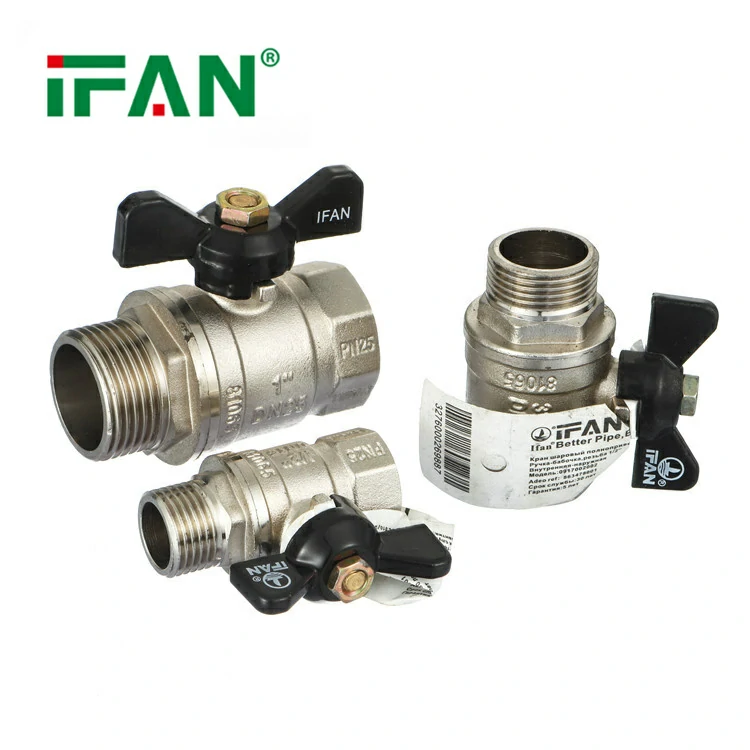
– Saltwater Systems: In saltwater or marine environments, brass is more vulnerable to galvanic corrosion and dezincification (where the zinc component of brass is leached out, weakening the structure). Brass alloys with higher copper content or those treated with protective coatings are better suited for marine applications.
– Chemical Exposure: Exposure to chemicals like acids, alkalis, or solvents can accelerate corrosion. Brass ball valves should be chosen carefully when used in chemical systems, as certain chemicals may interact negatively with the brass alloy, leading to pitting or surface erosion.
– High-Temperature Environments: Brass performs well under typical temperature conditions but may degrade faster in high-temperature systems. Exposure to extreme temperatures can cause the protective oxide layer on the brass surface to break down, accelerating corrosion.
Dezincification of Brass Ball Valves
One of the most significant concerns with brass ball valves, especially in certain water systems, is **dezincification**. This is a form of corrosion that occurs when the zinc component of brass is dissolved away, leaving behind a porous, weakened copper structure. Dezincification can compromise the strength and functionality of brass ball valves, leading to leaks and failures.
To prevent dezincification, dezincification-resistant brass (such as DZR brass) is often used. DZR brass alloys are specifically designed to resist this form of corrosion, making them suitable for use in environments with low pH or in systems with a high concentration of chlorine or other aggressive chemicals.
Protective Coatings and Treatments
To further enhance the corrosion resistance of brass ball valves, many manufacturers apply protective coatings or surface treatments. These coatings can help protect the valve from the harsh effects of chemicals, moisture, and environmental exposure. Common coatings include:
– Nickel Plating: Nickel plating adds an extra layer of protection to the brass, making it more resistant to corrosion, especially in marine and industrial applications.
– Chrome Plating: Chrome plating provides a shiny finish and additional corrosion resistance, often used for decorative purposes in household plumbing.
– Epoxy Coatings: Epoxy coatings are often used to protect the internal and external surfaces of brass ball valves, particularly in chemical and industrial systems, by preventing direct contact with corrosive fluids.
How to Maintain Brass Ball Valves for Optimal Corrosion Resistance
Proper maintenance is essential to prolong the life of your brass ball valve and ensure its performance. Here are some tips for maintaining corrosion resistance:
1. Regular Inspection: Periodically inspect brass ball valves for signs of corrosion, such as pitting, discoloration, or leakage. Early detection of corrosion can help prevent further damage.
2. Flush the System: In systems that handle fluids with high concentrations of minerals, chemicals, or salt, it’s important to regularly flush the system to remove any build-up that could contribute to corrosion.
3. Protect Against Extreme Conditions: If your brass ball valves are exposed to harsh conditions, such as extreme temperatures or aggressive chemicals, consider using additional protective coatings or opting for more corrosion-resistant alloys.
4. Proper Installation: Ensure that the ball valve is correctly installed and that it is compatible with the system’s pressure, temperature, and chemical characteristics. Improper installation can lead to corrosion hotspots and reduce the valve’s lifespan.
Conclusion
Brass ball valves offer excellent corrosion resistance, making them suitable for a wide range of applications. However, the extent of their corrosion resistance depends on factors such as alloy composition, environmental conditions, and the presence of protective coatings. For optimal performance and longevity, it is crucial to select the right type of brass alloy for your application and maintain the valve properly. Regular inspection and care can ensure that your brass ball valves continue to function efficiently, preventing costly repairs and downtime.
FAQs
1. Are brass ball valves resistant to corrosion?
Yes, brass ball valves are generally resistant to corrosion, especially in neutral and mildly alkaline environments. However, exposure to saltwater, extreme chemicals, or high temperatures can accelerate corrosion.
2. What is dezincification in brass ball valves?
Dezincification is a form of corrosion where zinc is leached out of the brass, weakening its structure. This can be prevented by using dezincification-resistant (DZR) brass.
3. Can brass ball valves be used in saltwater systems?
Brass ball valves can be used in saltwater systems, but they are more vulnerable to corrosion, particularly galvanic corrosion and dezincification. Choosing high-quality alloys or applying protective coatings can help.
4. How can I prevent corrosion in brass ball valves?
Prevent corrosion by regularly inspecting the valve, ensuring the water or fluid pH is neutral to slightly alkaline, and using protective coatings such as nickel or chrome plating.
5. Do brass ball valves need maintenance?
Yes, brass ball valves require periodic maintenance, including inspections for corrosion, flushing of the system to remove debris, and ensuring that the valve is properly installed and functioning.
Related products
-
Ball Valve
Brass Gas Valve
-
Ball Valve
Brass Ball Valve
-
Ball Valve
Brass Ball Valve


